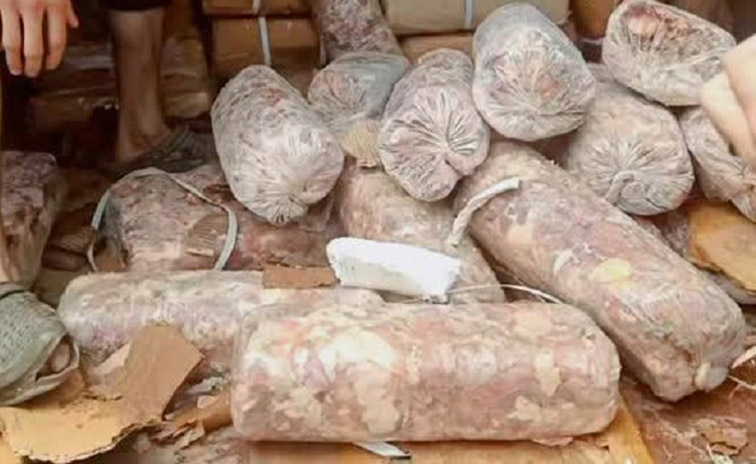Srinagar, Aug 11: Authorities in Jammu and Kashmir have seized and destroyed over 12,000 kilograms of rotten, adulterated and unhygienically stored meat since a UT-wide crackdown began. The operation has targeted products laced with harmful synthetic colours, as well as meat kept without proper cold storage facilities.
Speaking exclusively to Rising Kashmir, Commissioner FDA J&K, SmitaSethi, clarified that not all meat available in the market is unsafe, but several serious issues have been flagged, especially in storage and quality.
“You will not find rotten meat everywhere. There are two or three concerns one is meat laced with synthetic colours, especially used in items like kebabs, which are harmful. Such products are being destroyed,” she said.
The Commissioner highlighted that poor storage conditions, such as lack of cold storage facilities and improper packaging, have also led to contamination in several cases.
“In places where meat is stored without freezing, in sacks or polythene packets, and kept in unhygienic conditions, we are conducting thorough checks. Wherever we find violations, appropriate action is being taken,” she added.
Depending on the severity of the violation, the FDA is issuing improvement notices or initiating legal action. “Wherever we feel the offence is serious, strict action will follow,” she asserted.
Commissioner Sethi further revealed that the testing process takes time, typically 13 to 14 days for sample results. Despite this, the department has managed to seize approximately 12,000 kg of unsafe meat from both Kashmir and Jammu divisions so far.
As part of the intensified crackdown, she said, joint inspection teams are being formed at the district level, including officials from the Consumer Affairs & Public Distribution (CAPD), Animal Husbandry, Police, Housing & Urban Development, and Municipal Bodies.
“A proper team will be constituted to ensure comprehensive inspections. All relevant departments will be involved to make sure the inspection process is robust and effective,” she said.
The drive is part of a wider public health initiative aimed at ensuring food safety standards are met across meat markets in J&K.
On the question of FIRs, she clarified: “We are not the authority to file FIR.”
The seizures in recent weeks have been widespread. In Kupwara town, 20 quintals were destroyed today, while in Handwara 20 kilograms were seized and discarded. In Srinagar, a major haul of 1,200 kilograms was recovered from Zakura Industrial Estate on July 31. Across the Valley, more than 3,500 kilograms have been confiscated, including 2,500 kebabs tainted with synthetic colouring and 150 kilograms of contaminated meatballs in raids across Srinagar.
In Ganderbal’sNagbal area, 250 kilograms of visibly spoiled meat was destroyed on the spot. In Jammu, nearly 800 to 1,000 kilograms of expired packed meat and chicken were seized and destroyed at a cold storage facility. In Baramulla, 35 kilograms were destroyed during inspections last week.
Locals have questioned why such checks were not enforced earlier. “When livestock enters Kashmir, it is inspected. Why can’t such meat be checked before it reaches the markets?” asked GhulamNabi, a trader from Sopore. Mehraj-ud-Din, a resident of Srinagar, said the animal husbandry post on the highway needs more staff and equipment to detect substandard meat. Bashir Ahmad, a shopkeeper in Baramulla, demanded stronger enforcement: “They are playing with people’s lives for profit. They should face strict legal action.”
Health experts have raised concerns about the risks associated with consuming contaminated meat, warning that improper slaughtering, packaging, transportation, storage, and distribution can expose meat to harmful bacteria. This contamination can lead to foodborne illnesses such as food poisoning, diarrhoea, dysentery, typhoid, and other serious health conditions.
Experts have highlighted that unsafe meat is often transported in unhygienic packaging, such as thermocol boxes, and exposed to extreme conditions that accelerate spoilage and bacterial growth.
Doctors have stated that expired or unsafe meat must be disposed of scientifically, either through incineration or deep burial with the use of appropriate disinfectants, to prevent environmental contamination and protect public health.
Authorities have urged the public to report suspicious meat or unhygienic outlets. The FDA says the crackdown will continue at the district level with multi-department teams to ensure unfit meat never reaches consumers.








